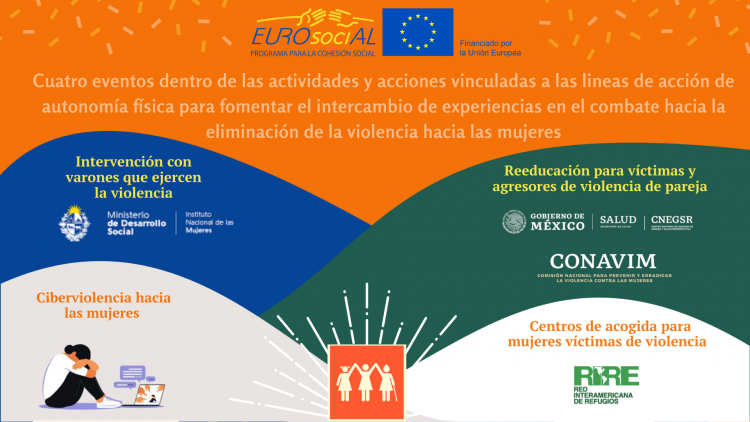The EU EUROsociAL+ Programme organised four events during the 16 days of activism against gender violence, addressing issues such as cyber violence and working with assailants.

From 25 November to 10 December, EUROsociAL+ mobilised for 16 days of activism against gender violence in Latin America and Europe. Several dialogue events were held to mark 25 November, the International Day for the Elimination of Violence against Women.
Cyberviolence
In a digitalised world, it is important to promote public policies that eradicate all forms of violence, including virtual violence. Hence the virtual meeting “Crossed views between Latin America and Europe in the fight against digital violence against women” held on 30 November. The goal of the seminar was to exchange good practices in the fight against digital violence on both continents.
Specifically, Meena Fernandes, from the European Parliamentary Research Service (EPRS) presented the study: Combating gender-based violence: Cyber violence, which has made the phenomenon of gender cyber violence visible at the European level and advocates the creation of training and education plans on cyber violence.
Ana-Clara Valla, from the Hubertine-Auclert Centre, stressed the importance of understanding that cyber violence can be a continuation of physical violence. A study by the centre shows that nine in ten female victims of violence also suffer from digital violence. France is taking specific action in this matter and has classified digital violence as a crime since 2014.
Shelters for women victims of violence
Secondly, on 9 December, as part of the “Programme to support leaders of shelters for women victims of violence in Latin America and the Caribbean”, the EUROsociAL+ programme co-organised a virtual meeting with the Inter-American Network of Refuges (RIRE). The purpose of the meeting was to share experiences and good practices to build resilience used by shelters to reduce the impact of the pandemic, particularly those related to mobility restrictions.
Margarita Guille, executive director of the RIRE network, talked about the impact of the pandemic on the care of women victims of violence. Teams in the field have been forced to transform the way they work, training in the use of digital platforms to effectively respond to demand. They also shared good practices such as the provision of meeting spaces where staff and women could share their needs and be heard, to face the impact of the pandemic on the mental health of the teams.
Work with men who commit violence
Thirdly, on 9 December, EUROsociAL+ organised an international seminar on “Challenges and proposals for intervention with men who carry out gender-based violence” in collaboration with the National Institute of Women of Uruguay (InMujeres-MIDES), the Uruguayan Agency for International Cooperation (AUCI), and the Delegation of the European Union to Uruguay .
This initiative is the result of more than four years of work with Uruguay in the implementation of the New National Plan for a life without gender violence and more specifically from a line of work based on the intervention with assailants to prevent recidivism and promote their reintegration in society.
The event also highlighted the work done by the EUROsociAL+ programme and organisations such as the European Network for the Work with Perpetrators of Domestic Violence (WWP EN), the University of Valencia and the Conexus association of Barcelona, leading to a valuable exchange of European and Latin American good practices.



